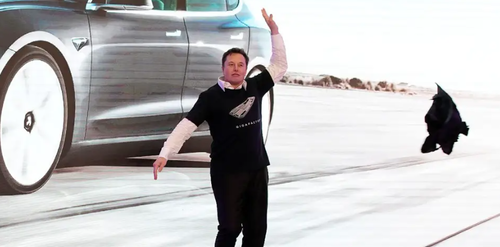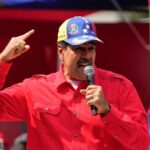
It's been an interesting confluence of developments for Tesla to end last week's trading. While most market participants were focused on the company's upcoming 3-for-1 split, two other pieces of news dropped that may wind up having a material impact for investors.
Yes, Tesla longs, even more of a material impact than dividing up the share structure in a different way! Tough to believe, we know...
Regardless, the California Department of Motor Vehicles is now joining the fray against Elon Musk, this week accusing the automaker of misleading customers "with advertising language on its website describing its Autopilot and Full Self-Driving technologies as more capable than they actually are," the LA Times reported.
Russ Mitchell, who has been dutifully following Tesla for years and providing excellent, California-based coverage on the company for the LA Times, broke the news Friday just after the market closed. The California DMV is accusing Tesla of "false advertising", his report says.
In a pair of complaints filed with the state Office of Administrative Hearings on July 28, the DMV said Tesla “made or disseminated statements that are untrue or misleading, and not based on facts.”
One example the DMV listed was the following language on Tesla's website:
“All you will need to do is get in and tell your car where to go. If you don’t say anything, your car will look at your calendar and take you there as the assumed destination. Your Tesla will figure out the optimal route, navigating urban streets, complex intersections and freeways.”
The article notes that consequences for Tesla could technically include "revocation of the company’s licenses to make or sell its cars in California", but that a lighter, less intense remedy is more likely.
On Friday, the DMV said that it seeks that “Tesla will be required to advertise to consumers and better educate Tesla drivers about the capabilities of its ‘Autopilot’ and ‘Full Self-Driving’ features, including cautionary warnings regarding the limitations of the features, and for other actions as appropriate given the violations.”
This isn't the only new bogey on the radar for Tesla. We also reported this weekend about the NHTSA investigating two accidents involving motorcycles in July that may have involved Autopilot. Both riders involved in the accidents, which were similar in nature, were killed. Both accidents took place at night with at least one Tesla on Autopilot following behind the bikes.
The agency now has suspicions "that Tesla’s partially automated driver-assist system was in use" during both accidents.
The investigations add another layer of scrutiny on Tesla's flagship vehicle selling point by regulators. While Elon Musk continues to deal with Chancery Court in Delaware over his Twitter deal, he is also being scrutinized by the Securities and Exchange Commission. Any blow to the company's Autopilot feature, including a potential recall, could wind up having profound financial consequences for the automaker.
It’s been an interesting confluence of developments for Tesla to end last week’s trading. While most market participants were focused on the company’s upcoming 3-for-1 split, two other pieces of news dropped that may wind up having a material impact for investors.
Yes, Tesla longs, even more of a material impact than dividing up the share structure in a different way! Tough to believe, we know…
Regardless, the California Department of Motor Vehicles is now joining the fray against Elon Musk, this week accusing the automaker of misleading customers “with advertising language on its website describing its Autopilot and Full Self-Driving technologies as more capable than they actually are,” the LA Times reported.
Russ Mitchell, who has been dutifully following Tesla for years and providing excellent, California-based coverage on the company for the LA Times, broke the news Friday just after the market closed. The California DMV is accusing Tesla of “false advertising”, his report says.
In a pair of complaints filed with the state Office of Administrative Hearings on July 28, the DMV said Tesla “made or disseminated statements that are untrue or misleading, and not based on facts.”
One example the DMV listed was the following language on Tesla’s website:
“All you will need to do is get in and tell your car where to go. If you don’t say anything, your car will look at your calendar and take you there as the assumed destination. Your Tesla will figure out the optimal route, navigating urban streets, complex intersections and freeways.”
The article notes that consequences for Tesla could technically include “revocation of the company’s licenses to make or sell its cars in California”, but that a lighter, less intense remedy is more likely.
On Friday, the DMV said that it seeks that “Tesla will be required to advertise to consumers and better educate Tesla drivers about the capabilities of its ‘Autopilot’ and ‘Full Self-Driving’ features, including cautionary warnings regarding the limitations of the features, and for other actions as appropriate given the violations.”
This isn’t the only new bogey on the radar for Tesla. We also reported this weekend about the NHTSA investigating two accidents involving motorcycles in July that may have involved Autopilot. Both riders involved in the accidents, which were similar in nature, were killed. Both accidents took place at night with at least one Tesla on Autopilot following behind the bikes.
The agency now has suspicions “that Tesla’s partially automated driver-assist system was in use” during both accidents.
The investigations add another layer of scrutiny on Tesla’s flagship vehicle selling point by regulators. While Elon Musk continues to deal with Chancery Court in Delaware over his Twitter deal, he is also being scrutinized by the Securities and Exchange Commission. Any blow to the company’s Autopilot feature, including a potential recall, could wind up having profound financial consequences for the automaker.






